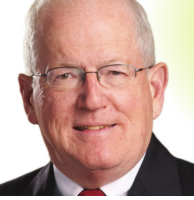Cook on Concord: Bob Baines was a great friend
Former Manchester mayor and West High principal made a lasting impact in the city

Nov. 4’s elections saw a sweep for Democratic candidates winning the governorships of New Jersey and Virginia, the mayor of New York City and the proposition in California authorizing redistricting. What this says about the future is unclear, but it was not a good sign for the Trump GOP.
In New Hampshire, odd numbered years bring municipal election in cities, which are nominally nonpartisan in form, meaning the final contests can be between candidates of the same party, but often are fairly clear about which party supports which contestants. Incumbent mayors won in Manchester, Concord, Keene and elsewhere, while the down-ballot contestants were more interesting.
Focusing on Manchester, where Mayor Jay Ruais, a one-term Republican, won over a late-entry opponent, other results changed the balance of power on the aldermanic board and strengthened the dominance of “progressive” members of the school board.
Prior to the election, the aldermanic board was split, seven members of each party holding seats. After the election, prominent Alderman-at-Large Joe Kelly Levasseur had been defeated by former mayoral candidate and Alderman-at-Large June Trisciani, and other results caused the Democratic majority to be solid. On the school board, results appeared to show a complete “progressive” board.
Going forward, Mayor Ruais will not have as contentious an aldermanic board to deal with as during his first term, but to the extent he proposes more moderate or conservative policies and budgets, may have a hard time getting them passed by the more progressive board.
One of the largest issues to be faced by Manchester and the state now is the fate of the Youth Development Center (YDC) property on River Road, once the present Sununu Center closes. This 130-acre state-owned property is slated to be sold, and the current state budget anticipates significant revenue from the sale.
The city is interested in how the property is going to be used and what tax revenue can be generated by it. Various proposals have been put forward over the years for potential uses, including a new high school for the city, a park or other “green space,” subsidized housing or mixed use.
Other considerations in how the space is going to be used include the fact that the property is in the city’s North End residential neighborhood of relatively expensive homes, and traffic on River Road has increased in recent years.
This writer has lived up the hill from the YDC for over 50 years and driven by it twice a day. To me, there is only one redevelopment option that meets all of the concerns and needs, and also offers a great opportunity to Manchester.
Mixed, high-end housing in a planned way that preserves some open space is the best option for the YDC property. A plan that combines two or three apartment-style buildings similar to the residence at 300 River Road, a popular condominium residence farther south on River Road and overlooking the Merrimack River, along with a condominium development of single units, such as the Straw Hill community north of the YDC, would have a number of advantages.
It would be attractive to those wishing city life and services, along with a short commute to work. Units of this type could sell for premium prices, such as the Manning Hill development across River Road commanded recently. It is unlikely many school children would live in these types of units, as few do either at 300 River Road or Straw Hill, so there would be a net property tax contribution to the city.
Traffic, while increased, would not be increased to the extent a governmental use or commercial/business use would create. Proper inclusion of green space, either employing recreation space, a par-3 golf course, tennis or other courts, hiking trails connecting to existing ones along the river, all could address the need for “open space” and, in the words of recent signs, “Keep YDC Green.” Portions of the existing treed area of the site could be preserved.
For years, people have moved out of Manchester to the surrounding communities, often because they could find nothing suitable in the North End.
While there certainly were other reasons people moved to the suburbs, as these people age, downsizing and getting into different types of housing, such as those proposed, become more attractive, as does being closer to the medical facilities, cultural resources and other features of the city. People in the North End larger houses also seek to find places to downsize, and do not have many options.
A development as described would draw people back to Manchester, increase its upper middle-class population, a need in vibrant cities and give more people a vested interest in the future of New Hampshire’s largest city. This is not elitist — it is just smart.
Brad Cook is a Manchester attorney. The views expressed in this column are his own. He can be reached at bradfordcook01@gmail.com